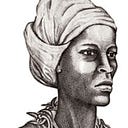The Poppy Belongs to Palestinians Too
Commemorating Armistice Day is not in conflict with marching for a ceasefire in Gaza
At 11 a.m. on November 11, 1918, the Armistice ending the fighting of the First World War began. The truce was followed by intense negotiations over what peace would look like following "the war to end all wars." Poppies became associated with World War I after the poem In Flanders Fields (written by Canadian doctor John McCrae while serving at Ypres) gained popularity. The opening lines are:
"In Flanders fields the poppies blow
Between the crosses, row on row,"
Poppies thrived in the soil that had been churned by the bombs in Flanders. The dead were buried in fields where the plants bloomed plentifully. The contrast between the vibrant life of a wild flower and the avalanche of death McCrae observed made the poem one of the lasting cultural artifacts that speaks to our shared humanity about the toll of war.
Following World War I, the poppy became a symbol of remembrance for the war dead in Great Britain and its colonies. This tradition continues today, and Remembrance Weekend is only a couple of days away. Artificial poppies worn on the lapels of politicians and news presenters in Great Britain and the Commonwealth have been miniature elephants in the room as calls for a ceasefire in Gaza grow and fall on unhearing ears.
Where Gaza is concerned, unfortunately, the poppy has become a shield and Remembrance Weekend a cudgel. British prime minister, Rishi Sunak, has lambasted a large pro-Palestinian March in London planned for Armistice Day as “disrespectful” and tried to have the demonstration banned. Home Secretary, Suella Braverman, voiced fears that the Cenotaph war memorial may be vandalized. Are these symbols more important than the principles they are meant to represent? An armistice is a truce. What could be a more fitting commemoration to the end of the Great War than demanding that world leaders come together to halt the mass death being inflicted on the people of Gaza by the Israel Defence Force.
Yesterday, I saw a Palestinian boy with his head blown open. In the place where his thoughts and dreams should live and his imagination should thrive, there remained only a bloodied cavern – a vacant partial skull that used to hold the most important parts of a child who was loved. Multiply this bloodshed by 4,000. That is how many children the Israeli bombardment has already killed. The slaughter is industrial in scale.
How many Palestinians must die as recompense for the October 7 attack by Hamas forces on Israel? 20,000? 50,000? 100,000? All of them?
These are not "children of darkness" or the people of Amalek the God of the Old Testament commanded the Hebrews to wipe out. I choose such illustrative examples advisedly. This is the genocidal language Israel's prime minister, Benjamin Netanyahu, is using about the Palestinians as we all watch a massive campaign of ethnic cleansing and war crimes against them play out on our televisions and social media feeds. Israeli bombardment has internally displaced 1.5 million of 2.3 million Gazans and killed over 10,000 of them. Something unspeakable is unfolding in Gaza – a burgeoning genocide – and it must be put to an end. Using Remembrance Weekend to stand in the way of demands for a ceasefire is inhumane.
The poppy belongs to the people of Palestine too.
The poppy is one of the national flowers of Palestine. The blooming flower represents the colors of the Palestinian flag – red, green, black and white. The poppy is often displayed as a sign of solidarity with Palestinians and represents their connection to their land, which is being destroyed and poisoned by Israeli bombardment. How contaminated will the soil be when this is all over? Will poppies even be able to grow?
If talk of solidarity with defenseless people being slaughtered in front of the world still sets Armistice Day off limits for you, what about the approximately 12,000 Arab Palestinians who served in the British armed forces during the Second World War? Some of them are still missing. Does the sacrifice of these unknown soldiers carry no weight? Should their descendants be excluded from the protection of the international laws on conflict their shed blood helped usher in? Is Remembrance Weekend not, at least in part, about them? Should the symbol of the poppy not honor them too?
The carnage in Gaza is a stain on humanity that must end. The poppy’s dual role in commemorating the war dead and as a symbol of solidarity with Palestine makes this Armistice Day a poignant reminder that lust for retribution in blood must have a limit. It is time for a ceasefire.
